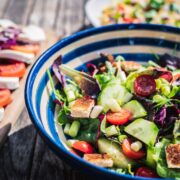
Nutrition Blogs: Helping You Achieve Your Health Goals
Proper nutrition is essential for overall health and wellness. The food we eat provides our bodies with the necessary nutrients to function properly, maintain a healthy weight, and reduce the risk of chronic diseases. Good nutrition is not only important for physical health, but it also plays a crucial role in mental health and well-being. By making informed food choices and incorporating nutrient-dense foods into our diets, we can optimize our health and live a vibrant and fulfilling life.
Key Takeaways
- Proper nutrition is essential for a healthy lifestyle.
- Nutrient-dense foods like leafy greens, berries, and nuts should be incorporated into your diet.
- Macronutrients play a crucial role in achieving fitness goals.
- Busy professionals can benefit from easy meal prep ideas.
- Staying on track with your diet during the holidays can be challenging but is possible.
- A plant-based diet can benefit both your health and the environment.
- Sugar can have negative effects on your health.
- Hydration is important for optimal health and performance.
- Healthy snacks like fruits, veggies, and yogurt can keep you fueled throughout the day.
- Reading nutrition labels can help you make informed food choices.
The Importance of Proper Nutrition for a Healthy Lifestyle
Proper nutrition is key to maintaining a healthy weight. When we consume a balanced diet that is rich in fruits, vegetables, whole grains, lean proteins, and healthy fats, we provide our bodies with the necessary nutrients while also keeping our calorie intake in check. This helps to prevent weight gain and reduce the risk of obesity, which is a major risk factor for chronic diseases such as heart disease, diabetes, and certain types of cancer.
In addition to weight management, proper nutrition also plays a crucial role in reducing the risk of chronic diseases. A diet that is high in fruits, vegetables, whole grains, and lean proteins can help to lower blood pressure, reduce cholesterol levels, and improve blood sugar control. These factors are important in preventing conditions such as hypertension, high cholesterol, and type 2 diabetes.
Furthermore, proper nutrition has a significant impact on mental health and well-being. Research has shown that certain nutrients can affect brain function and mood. For example, omega-3 fatty acids found in fatty fish have been linked to improved cognitive function and reduced symptoms of depression. Additionally, a diet that is high in fruits, vegetables, whole grains, and lean proteins provides the necessary vitamins and minerals that support brain health and help to reduce the risk of mental disorders.
Top 5 Nutrient-Dense Foods You Should Incorporate in Your Diet
1. Leafy Greens: Leafy greens such as spinach, kale, and Swiss chard are packed with essential nutrients including vitamins A, C, and K, as well as folate and iron. They are also rich in fiber, which aids in digestion and helps to keep you feeling full and satisfied.
2. Berries: Berries such as blueberries, strawberries, and raspberries are not only delicious but also incredibly nutritious. They are loaded with antioxidants that help to protect against oxidative stress and reduce the risk of chronic diseases. Berries are also high in fiber and low in calories, making them a perfect snack or addition to your meals.
3. Salmon: Salmon is an excellent source of omega-3 fatty acids, which are essential for brain health and heart health. It is also a great source of high-quality protein and contains important nutrients such as vitamin D and selenium. Including salmon in your diet can help to reduce inflammation, improve brain function, and support overall health.
4. Quinoa: Quinoa is a gluten-free grain that is packed with protein, fiber, and essential minerals such as magnesium and phosphorus. It is also a good source of antioxidants and has a low glycemic index, making it a great option for those looking to manage their blood sugar levels.
5. Greek Yogurt: Greek yogurt is a nutrient-dense food that is high in protein and calcium. It also contains probiotics, which are beneficial bacteria that support gut health. Greek yogurt can be enjoyed on its own or used as a base for smoothies, dressings, or dips.
The Role of Macronutrients in Achieving Your Fitness Goals
Macronutrients, which include carbohydrates, protein, and fat, play a crucial role in fueling the body for physical activity and achieving fitness goals. Carbohydrates are the body’s primary source of energy and are essential for high-intensity exercise. They provide the fuel needed to power through workouts and replenish glycogen stores in the muscles.
Protein is important for muscle repair and growth. It helps to rebuild damaged muscle tissue after exercise and supports the development of lean muscle mass. Consuming an adequate amount of protein is essential for those looking to build strength and improve athletic performance.
Fat is another important macronutrient that provides energy and helps to support hormone production. It also aids in the absorption of fat-soluble vitamins and helps to keep you feeling full and satisfied. Including healthy fats such as avocados, nuts, and olive oil in your diet can help to support overall health and optimize athletic performance.
5 Easy Meal Prep Ideas for Busy Professionals
1. Mason Jar Salads: Mason jar salads are a convenient and portable option for busy professionals. Simply layer your favorite salad ingredients in a mason jar, starting with the dressing at the bottom, followed by vegetables, protein, and greens. When you’re ready to eat, just shake the jar to mix everything together.
2. Overnight Oats: Overnight oats are a quick and easy breakfast option that can be prepared in advance. Simply combine oats, milk or yogurt, and your choice of toppings such as fruit, nuts, or seeds in a jar or container. Let it sit in the refrigerator overnight, and you’ll have a delicious and nutritious breakfast ready to go in the morning.
3. Sheet Pan Meals: Sheet pan meals are a great option for those who want to prepare a healthy dinner with minimal effort. Simply toss your choice of protein, vegetables, and seasonings on a sheet pan and roast in the oven until cooked through. This method allows for easy cleanup and ensures that all components of your meal are cooked at the same time.
4. Stir-Fry: Stir-fry is a quick and easy meal that can be customized to fit your preferences. Simply sauté your choice of protein, vegetables, and sauce in a pan until cooked through. Serve over brown rice or quinoa for a complete and nutritious meal.
5. Protein Boxes: Protein boxes are a convenient option for those who want a balanced and portable meal. Simply pack a variety of protein-rich foods such as hard-boiled eggs, grilled chicken, hummus, and nuts, along with fruits and vegetables, into a container. This allows you to have a nutritious meal on the go without the need for cooking or reheating.
How to Stay on Track with Your Diet During the Holidays
The holiday season can be a challenging time to stick to a healthy diet, as there are often tempting treats and indulgent meals everywhere you turn. However, with some planning and mindful eating strategies, it is possible to stay on track with your diet during the holidays.
One strategy is to plan ahead and make healthy choices whenever possible. If you know you will be attending a holiday party or gathering, try to eat a balanced meal beforehand so that you are not overly hungry when you arrive. This can help to prevent overeating and making unhealthy food choices out of hunger.
Another strategy is to practice portion control. It’s okay to indulge in your favorite holiday treats, but try to do so in moderation. Instead of depriving yourself completely, allow yourself a small portion of your favorite dessert or treat and savor every bite.
Additionally, it can be helpful to focus on the social aspect of the holidays rather than just the food. Spend time with loved ones, engage in activities that bring you joy, and focus on creating meaningful memories rather than solely focusing on the food.
The Benefits of a Plant-Based Diet for Your Health and the Environment
A plant-based diet has been shown to have numerous health benefits and can also have a positive impact on the environment. A plant-based diet focuses on consuming whole foods such as fruits, vegetables, whole grains, legumes, nuts, and seeds, while minimizing or eliminating the consumption of animal products.
One of the main health benefits of a plant-based diet is its ability to reduce the risk of chronic diseases. Research has shown that those who follow a plant-based diet have a lower risk of developing conditions such as heart disease, type 2 diabetes, and certain types of cancer. This is due to the high intake of fiber, antioxidants, and phytochemicals found in plant-based foods, which help to reduce inflammation and oxidative stress in the body.
A plant-based diet is also beneficial for the environment. Animal agriculture is a major contributor to greenhouse gas emissions, deforestation, and water pollution. By reducing or eliminating the consumption of animal products, individuals can help to reduce their carbon footprint and minimize their impact on the environment.
The Truth About Sugar and Its Effects on Your Health
Consuming too much sugar can have negative effects on your health. When we consume excess sugar, it can lead to weight gain and an increased risk of chronic diseases such as obesity, type 2 diabetes, and heart disease.
One of the main reasons why sugar can contribute to weight gain is that it is high in calories but low in nutrients. This means that it provides empty calories that do not provide any nutritional value. When we consume excess calories from sugar, our bodies store the excess energy as fat, leading to weight gain over time.
Furthermore, consuming too much sugar can lead to insulin resistance, which is a precursor to type 2 diabetes. When we consume large amounts of sugar on a regular basis, our bodies become less responsive to insulin, which is the hormone responsible for regulating blood sugar levels. This can lead to elevated blood sugar levels and an increased risk of developing type 2 diabetes.
In addition to weight gain and an increased risk of chronic diseases, consuming too much sugar can also have negative effects on dental health. Sugar feeds the bacteria in our mouths, which can lead to tooth decay and cavities. It is important to practice good oral hygiene and limit the consumption of sugary foods and beverages to maintain optimal dental health.
The Importance of Hydration for Optimal Health and Performance
Staying hydrated is essential for optimal health and physical performance. Water makes up a significant portion of our bodies and is involved in numerous physiological processes such as digestion, circulation, temperature regulation, and waste removal.
When we are dehydrated, our bodies are not able to function properly. Even mild dehydration can lead to symptoms such as fatigue, headaches, dizziness, and poor concentration. It can also affect physical performance by reducing endurance, strength, and coordination.
In addition to its role in maintaining overall health, staying hydrated is especially important for those who engage in physical activity. When we exercise, we lose water through sweat, which needs to be replaced to prevent dehydration. It is recommended to drink water before, during, and after exercise to ensure proper hydration.
The amount of water needed varies depending on factors such as age, sex, activity level, and climate. As a general guideline, it is recommended to drink at least 8 cups (64 ounces) of water per day. However, individual needs may vary, so it is important to listen to your body and drink when you are thirsty.
5 Healthy Snack Ideas to Keep You Fueled Throughout the Day
1. Apple slices with almond butter: Apple slices are a great source of fiber and antioxidants, while almond butter provides healthy fats and protein. This combination makes for a satisfying and nutritious snack that will keep you fueled throughout the day.
2. Greek yogurt with berries: Greek yogurt is high in protein and calcium, while berries are packed with antioxidants and fiber. Combining the two creates a delicious and nutritious snack that will keep you feeling full and satisfied.
3. Hummus with carrot sticks: Hummus is made from chickpeas, which are a great source of protein and fiber. Pairing hummus with carrot sticks provides a satisfying crunch and a boost of vitamins and minerals.
4. Trail mix: Trail mix is a convenient and portable snack that can be customized to fit your preferences. Combine a variety of nuts, seeds, dried fruit, and dark chocolate for a balanced and energizing snack.
5. Hard-boiled eggs: Hard-boiled eggs are a great source of protein and healthy fats. They are also portable and can be enjoyed on their own or added to salads or sandwiches for an extra boost of nutrition.
How to Read Nutrition Labels and Make Informed Food Choices
Reading nutrition labels can help you make informed food choices and ensure that you are consuming a balanced diet. Here are some tips for reading nutrition labels:
1. Start with the serving size: The serving size is the amount of food that the nutrition information is based on. Make sure to compare the serving size listed on the label to the amount you actually consume to get an accurate understanding of the nutrients you are consuming.
2. Check the calories: Calories provide a measure of how much energy is in a serving of food. Pay attention to the calories per serving and consider how it fits into your overall daily calorie needs.
3. Look at the macronutrients: The macronutrients listed on the label include carbohydrates, protein, and fat. Aim for a balance of these nutrients in your diet, and be mindful of any specific dietary needs or restrictions you may have.
4. Consider the added sugars: Added sugars are sugars that are added to foods during processing or preparation. They can contribute to excess calorie intake without providing any nutritional value. Look for foods that are low in added sugars or choose foods that contain natural sugars from fruits or dairy products.
5. Check the ingredient list: The ingredient list provides information about what is in the food product. Ingredients are listed in descending order by weight, so the first few ingredients are the most abundant. Look for foods that have a short ingredient list and avoid products that contain artificial additives or preservatives.
By reading nutrition labels and understanding the information provided, you can make informed food choices that align with your health and wellness goals.
Proper nutrition is essential for overall health and wellness. By incorporating nutrient-dense foods into our diets, fueling our bodies with the right macronutrients, staying hydrated, and making informed food choices, we can optimize our health and live a vibrant and fulfilling life. It is important to remember that nutrition is not about restriction or deprivation, but rather about nourishing our bodies and enjoying a balanced and varied diet. By making small changes to our eating habits and adopting a mindful approach to food, we can make positive changes that will have a lasting impact on our health and well-being. So let’s prioritize proper nutrition and make healthy choices for our overall health and wellness.
If you’re looking for more ways to improve your overall health and well-being, be sure to check out this article on fueling your body with top nutrition tips for a healthier you. It provides valuable insights and practical advice on how to make better food choices and optimize your diet for optimal health. Whether you’re trying to lose weight, gain muscle, or simply improve your energy levels, this article has got you covered. So why wait? Start reading and start nourishing your body today! (source)
FAQs
What are nutrition blogs?
Nutrition blogs are online platforms that provide information and advice on healthy eating habits, food choices, and nutrition-related topics.
How can nutrition blogs help me achieve my health goals?
Nutrition blogs can provide you with valuable information and tips on healthy eating habits, meal planning, and food choices that can help you achieve your health goals.
What kind of information can I find on nutrition blogs?
Nutrition blogs can provide you with information on various topics such as healthy eating habits, meal planning, food choices, nutrition-related health issues, and recipes.
Are nutrition blogs reliable sources of information?
The reliability of nutrition blogs can vary, so it is important to check the credentials of the author and the sources of information provided. It is always best to consult with a registered dietitian or healthcare professional for personalized advice.
Can nutrition blogs provide personalized nutrition advice?
Nutrition blogs can provide general information and advice on healthy eating habits, but they cannot provide personalized nutrition advice. It is always best to consult with a registered dietitian or healthcare professional for personalized advice.
Are nutrition blogs free to access?
Most nutrition blogs are free to access, but some may require a subscription or payment for access to premium content or services.


















